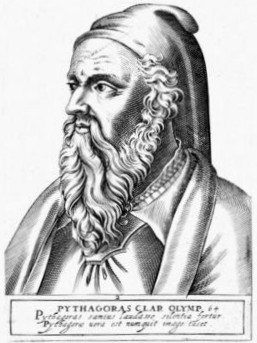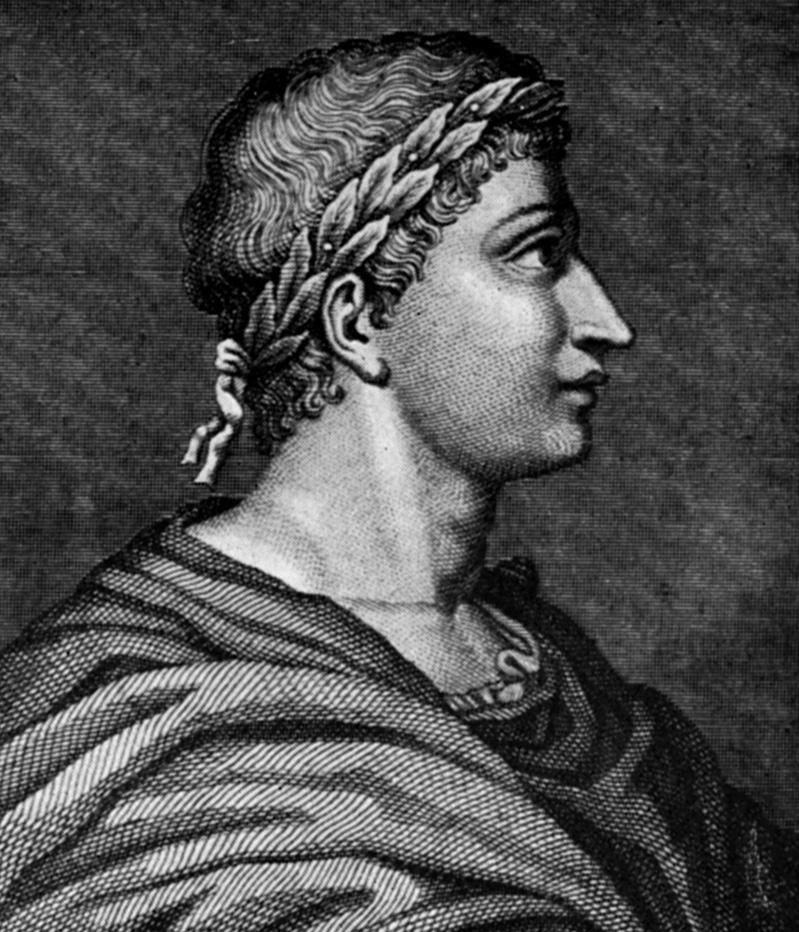
The essay was published in August issue of the Journal Calcutta Review, Calcutta University, 1932.
Pythagoras: The Vegetarian
Ever since Western scholars have occupied themselves with India's time-honoured culture, they have noted again and again that all the utterances of her spirituality are characterized by a prominently religious attitude, extant even in her attainments in the historical and scientific disciplines. This religious attitude too is responsible for the depth of her admirable philosophical speculation. It accounts, moreover, for the subtlety and rigour of the postulates of her various ethical systems, and explains the important part which those postulates once played, and partly still play, in her cultural life. Once of the most conspicuous of those postulates is the prohibition of animal diet. The Mahābhārata, the Smrtis, and numerous other Sanskrit works, down to the earliest of the Sānkhya scriptures, bear testimony to the fact that vegetarianism was once enjoined by Hinduistic ethics, where it still survives as an indispensable postulate amongst most of the modern Brahmin clans.
Aśoka's edicts eloquently speak of the practical influence this postulate exercised on the daily life of the great Buddhist ruler and his zealous subjects. This strictly vegetarian mode of life of nearly the whole population of present Gujarat, Kathiavad, Cutch and Rājaputānā tells its tale of the lovely influence of Śvetāmbara Jainism, which has been counting vegetarianism amongst its chief restrictions since time immemorial.
Yet, if the present historical theories are correct, vegetarianism was not confined to India, even at the time of Mahāvira Svāmi and Lord Buddha. The far-off Occident also could boast of a powerful preacher of vegetarianism in those remote days, although it must be admitted that his practical influence did not outlive his fame. This preacher of vegetarianism was none else but the Greek philosopher Pythagoras. History supposes him to have been born about 590 B.C. on the island of Samos in the Ionian Sea, to have undertaken vast travels all over the Old World, and finally to have settled down at Crotona, in South Italy, where King Numa Pompilius became his admirer and disciple.
An account of Pythagoras and his teachings is given in the 'Metamorphoses' of the Latin poet Ovid, who died A.D. 18 in exile, somewhere on the shores of the Black Sea, far off from the refined civilization of his beloved Rome. Ovid's art is famous for its elegance, its gracefulness and gaiety. Some of his works, such as the 'Ars Amandi' (the Latin 'Kāma-Śāstra'), are even frivolous, if not lascivious, and made his own by no means prudish contemporaries fell scandalized. These stanzas of the 'Metamorphoses' however which contain Ovid's account of Pythagoras, seem to reveal quite a new and a serious face of the dallying poet. They are permeated by a wonderfully sincere tone of sympathy with the 'Samian Sage' and of partisanship with his doctrine of self-denying compassion. They make the reader feel as if he were listening not to the notorious author of the 'Ars Amandi' but to a most rigorous moral preacher, who does not lack a dose of pastoral pathos either. Fascination as Ovid's account of Pythagoras may thus be from the literary standpoint, it is not without interest for the historian too, to whose knowledge it may be said to add some new details.

Pythagoras of Samos (Πυθαγόρας ὁ Σάμιος), c. 570 - c. 495 BCE.
These considerations may justify the full account being rendered here in literal translation. It has the form of a sermon delivered by Pythagoras before King Numa Pompilius, and runs as follows (Metamorphoses, Liber XV, stanzas 6-178):
"At that place (viz., Crotona), there lived a man, who was a Samian by birth. His hatred of tyranny had prompted him to leave Samos and its ruler, and to live in voluntary exile.
By spiritual means, he approached the Gods, remote though they be in their celestial spheres, and whatsoever nature withholds from the human eye, he perceived with the mental one. After he had fathomed all things by reason and attentive scrutiny, he would give out the essence. Before assemblies of silently listening men, whom his words struck with wonder, he would proclaim his teachings, speaking of the origin of the universe, the causes of things, and what their nature was, what God was, where the snows came from, how lightning was caused, whether Jupiter or the winds were thundering from the shaking clouds, how earthquakes came about, by what laws the stars were moving, and whatsoever lies hidden from human knowledge.
He too was the first to argue against animal food being placed on the table, and to pronounce words as the following, which, reasonable though they be, yet did not find believers:
'Beware, Oh mortals', he exclaimed, 'of defiling your bodies with sinful food! There are cereals, there are fruits, bending the branches down by their weight, and luxurious grapes on the vines. There are sweet vegetables and herbs which the flame can render palatable and mellow. Nor are you denied milk, nor honey, fragrant of the aroma of the thyma flower. The bountiful earth offers you an abundance of pure food, and provides for meals obtainable without slaughter and bloodshed'.
It is the beasts that appease their hunger with flesh, and yet not all of them. For the horses and sheep and cattle live on grass. Armeni's tigers and fierce lions, however, and wolves and bears, and others whose nature is wild and brutish, they do delight in bloody meals, Oh how atrocious is it to think how entrails are buried in entrails, how one greedy body grows fat on another creature's body, which it has devoured, and how one animal lives on the death of another!
It appears that of all the wealth that benign Earth, the best of mothers, provides, nothing pleases thee unless thou canst inflict dreary wounds with cruel teeth, and imitate the Cyclops and their jaws. Nor dost thou seem able to appease the cravings of the greedy and degenerate stomach, unless thou killest another creature!
But in that remote age which we are accustomed to call the Golden one everybody was content with the fruit of trees, and with such vegetables as the soil produces. Nobody would pollute his lips by the touch of animal blood. At that time, birds moved safely in the air, fearlessly did the hare gambol in the midst of the meadow, nor did the fish fall a victim to the angler's hook, in his easy confidence. In short there was no persecution, no fear of being tricked into ruin, and all the creatures were at peace.
But since some unfortunate originator, whosoever he was, began to begrudge the lions their meals, and allowed animal food to enter his body, the way to atrocity has been open. It is possible that first of all it was the blood of ravenous beasts only that stained and heated the killing knife. There, man ought to have stopped. For in their case, we may well exculpate ourselves by asserting with self-complacence that we had to put to death those brutes, because they had attempted our lives. But admitted that they had been put to death justly, nothing can justify our eating them.
Further crime has arisen therefrom. The boar is believed to have been the first victim deserving death, because with his protruding snout, he uprooted the seeds and spoilt the harvest of the year. Then the goat is said to have been slaughtered at the altar of the avening Bacchus, because it had browsed the vines. Both of them were ruined by their offence. What sin however did the sheep commit, those peaceful creatures, born to protect man, that carry nectar in their full udders, and offer their wool as soft coverings, thus being more useful by their life than death? What offence did the cattle commit, those creatures without deceit and malice, creatures so innocent, so harmless, born only to suffer hardships?
Ungrateful, unworthy indeed of the gift of corn is the man who has the heart to slay the cultivator of his fields, to hit with his axe the neck of the confiding creature, from which the burden of the plough has just been removed, the same neck that has become worn by the repeated labour of turning up its owner's hard soil, and of securing his harvest!
Nor is it enough that such crimes were committed! But people even made the Gods responsible for their atrocities, and believe the divine power to rejoice in the murder of the toiling bullock.
The sacrificial animal, void of the least blemish, distinguished by beautiful shape (for it is dangerous to be found pleasing), and adorned with fillets and gold, is placed before the altar. Unsuspecting, it hears the incantations, and sees its forehead between the horns marked with the same corn it once helped to cultivate! And then the death blow stretches it to the ground, and its blood stains the knife which it perchance beheld reflected in the clear water of the sacrificial basin!
Then they tear the entrails from the still living body to examine them, and pretend thus to find out the will of the Gods.
And of such flesh (I wonder whence comes such a greed for impure food in man!) you dare to make a meal, Oh human race!
Oh I implore you, don't do it! Listen to my warning! Be bold and realize that whenever you gratify the appetite of your palate, by tasting the flesh of cattle, you feast on your own field-labourers!
And now, since a God inspires my lips, I will duly obey the inspiring deity, and throw open my Delphi. Yea throw open heaven itself, and disclose the oracles of the sublime mind. Great truths will I sing, which the intelligence of our forefathers never fathomed, and which have long remained hidden. For it is a joy to move high up amongst the stars, it is a joy to travel beyond the clouds, leaving far behind the earth and our dull abodes, to stand on the shoulders of mighty Atlas, to watch from far away the human race, as they wander far and wide, devoid of all reason, and a joy it is thus to admonish them, the trembling ones, in their fear of death, and to unroll the book Fate:
Oh race terrified by the shape of cold death, why do you fear Styx, why fear vain shadows and empty words, the creations of poets and the dangers of an unreal world?
Do not believe that our bodies could possibly be exposed to any further hardships, after once the flame of the funeral pyre or the decay of old age has consumed them! The souls however can never die, but leaving their former habitations, they live on in new abodes, which they enter to dwell there.
So I was, at the time of the Trojan War, Euphorbus, the son of Panthous (for I do remember), whose breast was pierced by the heavy spear of the younger son of Aureus. Only recently, I recognised the shield which I had once borne on my left arm, in a temple of Juno at Agos, the city of Abas.
All things change, there is no death anywhere. The spirit comes from here and goes thither, starts from there and comes hither, and occupies whatever abode it chooses. From wild beasts it passes into human bodies, and our own spirit passes into wild beasts. It can never perish, but just as soft wax can be modelled into new designs, just as it does not remain in its former state, nor keeps one and the same shape, and yet remains one and the same itself, just so do I teach the soul it remain always the same, wandering into various forms.
Therefore, lest piety be vanquished by gluttonous greed, I warn you as a seer, refrain from expelling kindred souls by sinful murder! Do not allow blood to be fed on blood!
Since I am sailing thus on a vast ocean, having given all my sails to the winds, let me continue: In all the world, there is nothing that lasts. All things are floating, and every shape is formed so that it must change forever and ever."
In the following stanzas (179-452), the inconsistency of all shapes and conditions is dwelt upon and exemplified, such as the alternation of day and night, the seasons, weather, geological phenomena, diseases and their cures, spontaneous generation, historical happenings etc.
Finally, Ovid makes the philosopher conclude his long lecture with these words (stanzas 453-478):
"But I must not digress too far, my steeds forgetting, as it were, to hasten towards to goal! To make it short, the sky itself with all that exist under it, the earth with all that is upon it, all things keep changing their shapes.
So do we too, part of the universe as we are, since we consist not of body exclusively, but also of agile souls, and we can choose as our abodes the bodies of wild beasts, or we can enter the bodies of tame cattle.
So we ought to leave safe and unmolested those bodies, since they may possible be serving as abodes to the souls of our parents or brothers or of people linked to us by whatsoever bonds, or of other human creatures! Careful ought we to be not to load our stomachs with Thyestean meals.
To what sin does the impious man give himself up who cuts the throat of the calf, coldly shutting his ear to its woeful wailing, or the man who is capable of butchering the kid, in spite of its bleating, which so closely resembles the weeping of little human children? Or the man who can feast on the fowl that he once used to feed with his own hand! All of them are, as it were, on the way to the murder of human beings. For insignificant is the step from the former deed to the full crime, and subtle the transition from one to the other.
Therefore, let the bullock go on ploughing till he will die of old age! Let the sheep supply you with a means of protection from the cold north wind and its terrors! Let the goat, returning from the pastures, offer her udder to your hands to be milked! Have done with nets and foot-snares, with nooses and with huntsman's tricks! Leave of deceiving the bird with lime rods, desist from scaring the hart into ruin with stringed feathers, and give up concealing crooked books in deceiving baits!
If you insist upon killing creatures that harm you, well confine yourself to killing them! Beware of letting your lips touch animal diet! Pure and gentle be the food you partake of!"
This account of Ovid's with its clearly pronounced postulate of vegetarianism raises the question as to the origin of the Pythagorean teachings with greater force than any other of the traditions concerning the 'Samian Sage', scanty and uncertain as they are.
The Jaina religion, which proclaims strict vegetarianism as once of its chief ethical postulates even now-a-days, had been spread in India, centuries before Pythagoras, in the shape of the teachings of Pārśvanātha, the 23rd Jina, and his predecessors, and during Pythagoras's life-time, Vardhamāna, the 24th Jina, was teaching and preaching there. So was Gautama Buddha, the founder of Buddhism, whose ethics then likewise enjoined the protection of animal life in the form of a more or less strict vegetarianism. The Sānkhya doctrine too, which is full of rules commanding it, existed at that time.
It is a historical fact that Pythagoras did visit the East, and it is known that wherever he travelled, he was guided by the wish to study the wisdom of all those countries. So he was an adept in the mysteries of Ancient Egypt, and tradition says that the doctrines and practices of the Jews and even of the Druids were no less familiar to him than the highest of the Orphic secrets.
Thus, historically speaking, it is quite possible that Pythagoras's postulate of vegetarianism may go back to the Jaina, the Buddhist, or the Sārikhya ethical ideal, forming another of the numerous rivulets and rivers that streamed forth from the rich source of Indian Wisdom.
The probability of this supposition is raised to a certainty, if one realises that Pythagoras bases his postulate of vegetarianism on the doctrine of metempsychosis (Punarjanma) which is indeed purest Indian philosophy. It need not be added that the instances of Pythagoras remembering his former births (Jatismara) are of the very same type as those of the Jātakas and Jaina legends.
It will only have to be ascertained from which of the three ancient Indian traditions Pythagoras derived his wisdom - from Sāiikhya Philosophy, Jaina Philosophy, or Buddhist Philosophy, all three of which can raise their claim with equal right.
Perhaps the question will never be decided.

Ovid (Publius Ovidius Naso), 43 BCE - 17/18 CE.
 Dr. Charlotte Krause
Dr. Charlotte Krause